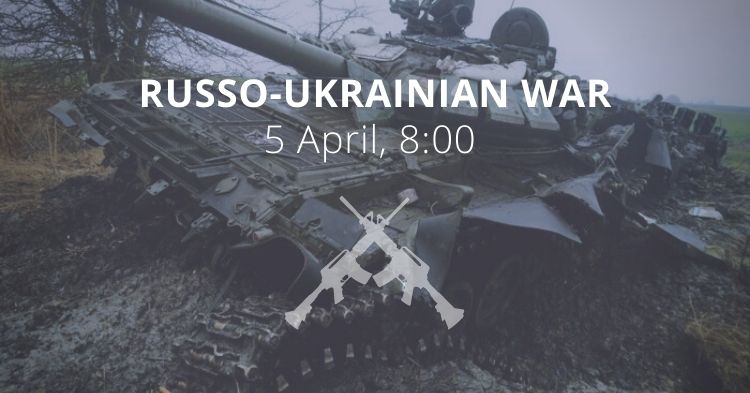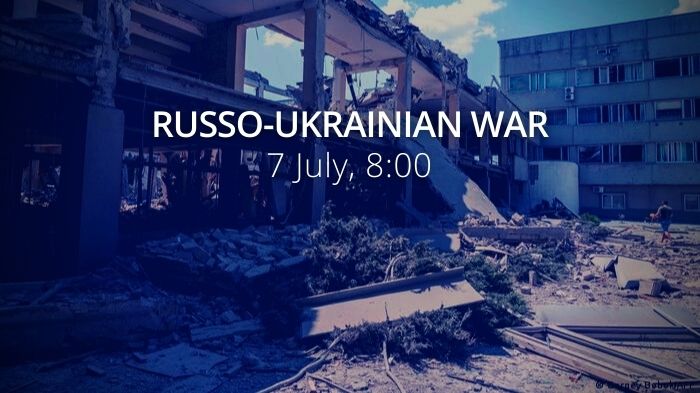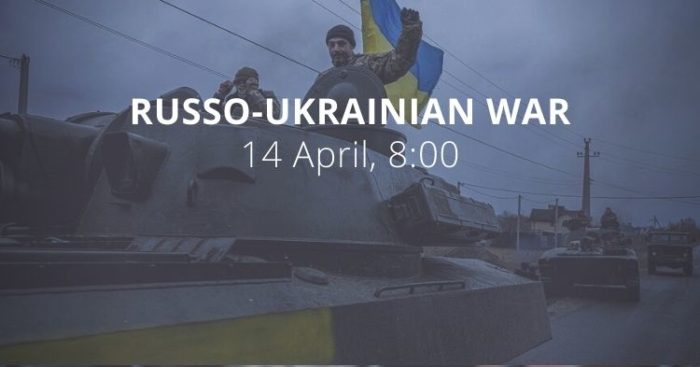Morning report day 41 – April 05
The report is based on media reports, expert analyses, and official information posted online.
Situation
According to information from the General Staff as of 06.00 05.04.2022. The midnight assessment was, unfortunately, not published:
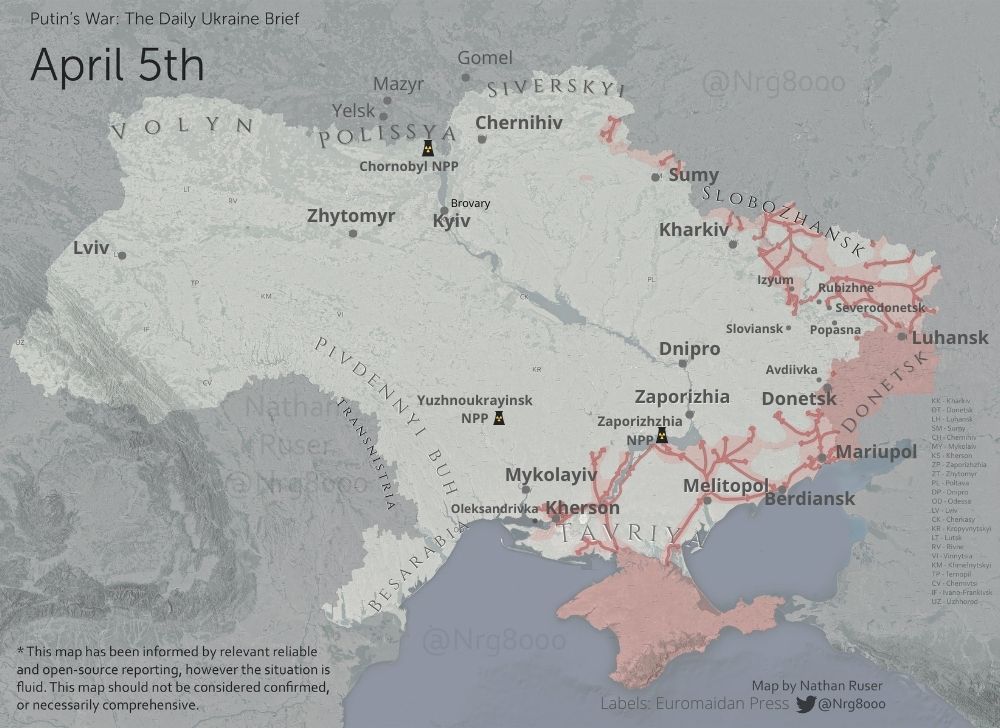
The units withdrawn from Polissya and Siverskyi are moving to new operational areas. The redeployment of troops of the Central Military District from the territory of Ukraine has been completed. The designated units of the above, after the completion of the restoration of combat capability, will be moved to the area of the settlement Valuyki [about 130 km east of Kharkiv and northeast of Izium] and included in the offensive groups of troops.
The movement of columns of armaments and military equipment on the territory of the Republic of Belarus in the direction of the railway stations Gomel, Yelsk, and Mazyr for loading on railway echelons is noted. A significant part of the aircraft and helicopters of the Air and Space Forces of the Armed Forces of the Russian federation were relocated from the airfields of the Republic of Belarus to the territory of Russia.
The Russian forces concentrated their main efforts on preparations for the resumption of the offensive with the help of separate units of the 6th and 20th All-Army, 1st Tank Army, Baltic and Northern Fleets, as well as attempts to surround the Joint Forces. The forces replenish supplies of food, fuel, oil, and ammunition.
The Russian occupiers continue to blockade Kharkiv, continuing artillery shelling and further destroying the city's residential neighborhoods and infrastructure.
- In the direction of Sloviansk, the Russian forces are trying to resume offensive operations. In the direction of Barvinkove they have partial success, advanced 7 km, and took control of the village of Brazhkivka. Also, the battalion tactical group of the 1st Tank Regiment attacked in the direction of the settlement of Sulyhivka [15 km south of Izium] but had no success.
- The Russian forces are working to restore the bridge in the city of Izium to improve the movement of Russian troops in this direction and to ensure the crossing of the river Siversky Donets.
In the Donetsk and Luhansk areas
, the Russian occupiers are focusing their efforts on taking control of the Popasna and Rubizhne districts, establishing full control over Mariupol, and preparing offensive operations near the Zolota Nyva settlement.
- In the areas of Borivske, Novoluhanske, Solodke, Marinka, and Zolota Nyva, the forces continued artillery shelling of positions of units of the Armed Forces of Ukraine and civilian infrastructure.
- The Russian forces carried out assault operations near the settlements of Novotoshkivske, Nyzhne, Popasna, Kalynove, Stepne, Rubizhne, Troitske, Novobakhmutivka, and Novoselivka Druha, but were unsuccessful.
- Russian invaders inflicted massive artillery and airstrikes on the city of Mariupol.
🔸Russian forces destroyed 90% of infrastructure in Mariupol - mayor
Mariupol Mayor Vadym Boichenko: "Currently, 90% of our infrastructure has been destroyed, 60% was hit directly by artillery or air strikes, and 40%, unfortunately, is beyond repair.”https://t.co/rpz4lBrXTX pic.twitter.com/vO6shlcaOq
— Euromaidan Press (@EuromaidanPress) April 5, 2022
In the direction of the Pivdennyi Buh directions, the occupying forces carry out assault actions with the support of artillery to take control of the settlement of Oleksandrivka, having partial success. In the area of the settlements of Lyubyne, Myrne, and Kopani, the Russian occupiers fired artillery at the positions of the Armed Forces of Ukraine.“
The Russian Armed Forces have allegedly offered the units of the Ukrainian Forces in Mariupol to lay down their arms and leave for territories controlled by Kyiv from 06.00 Moscow time on April 5, according to RIA.
“The Ministry of Defence of the Russian Federation stated that all those who laid down their arms in Mariupol are guaranteed the preservation of life, it is proposed to announce a “complete silence regime” from 9.30 Moscow time. Both sides must raise flags: from the Russian side - red, from the Ukrainian side - white along the entire line of contact.”
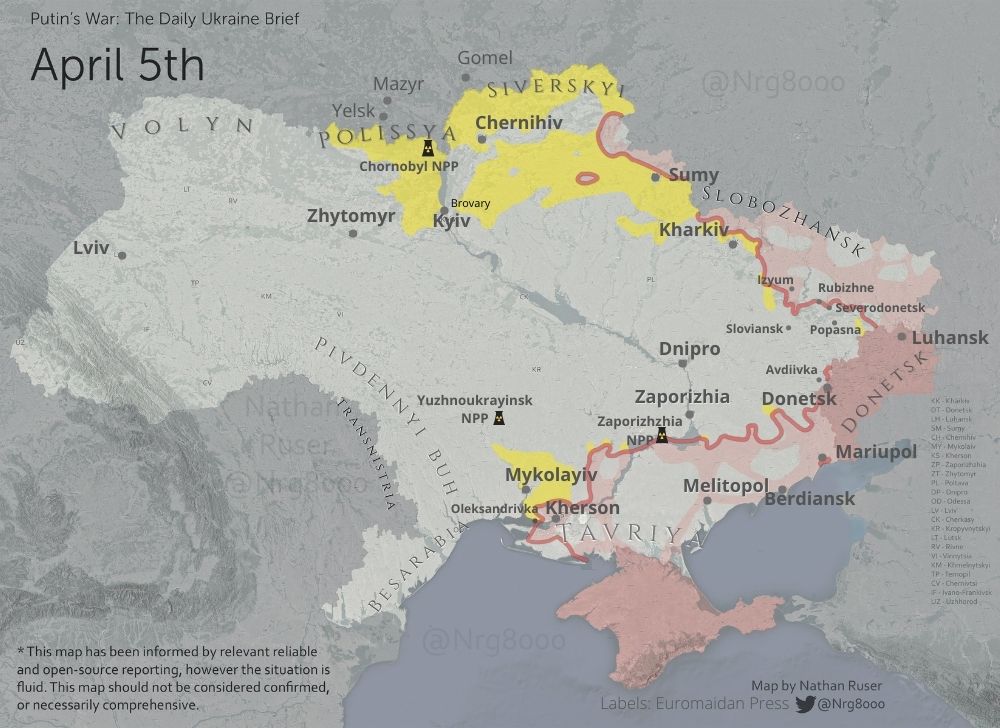
During the last 24 hours, the Ukrainian General Staff has reported on the Russian manning and logistic challenges:
- The Russian occupying forces continue to suffer losses. They have big problems with the staffing of combat units and support units. The forces’ personnel were demoralized, which led to an increase in the number of desertions and the refusal of servicemen of the armed forces of the Russian Federation to take part in the war on the territory of Ukraine.
- Russian forces continue to suffer losses in the course of full-scale armed aggression against Ukraine. During the whole Russian-Ukrainian war, from February 24, 2022 year, representatives of the military command of the armed forces of a Russian federation only twice announced the loss of personnel of Russian troops fighting in Ukraine.
- Despite the so-called "official" Russian number of casualties, the losses of individual units and subdivisions of the Russian occupiers are periodically known. According to available information, the losses of the 20th Motorized Rifle Division (Kamyshin, Volgograd Region) of the 8th All-Military Army of the Southern Military District, in particular: the 33rd, 255th, 294th Motorized Rifle Regiments, which returned to their permanent locations, amounted to 40% of personnel, weapons and military equipment. As a result, a significant number of servicemen who were lucky enough to return are trying to retire.
- The existing military medical facilities in Russia and Belarus do not allow for the treatment of such a significant number of wounded servicemen of the Russian occupying forces on the territory of Ukraine. Thus, the medical staff of the central district hospital in Glushkovo, Kursk region, has been transferred to an intensified duty regime. This is due to the fact that in the period from March 29 to April 2, from the territory of the Sumy region to the medical institution came about 100 wounded Russian occupiers.
- In the city of Izium, due to significant losses of personnel of the 237th Tank Regiment and the 752nd Motorized Rifle Regiment of the 3rd Motorized Rifle Division, the invaders were forced to equip a field hospital in the local school.
- Russian military leadership is trying to make up for the existing losses of officers using the officers of higher military educational institutions. According to the available information, the Military Academy of the Signal Corps in Saint Petersburg (Russia) is urgently training officers to replace positions in military units.
Military conscripts in the Russian-backed Donbas region have been sent into front-line combat against Ukrainian troops with no training, little food and water, and inadequate weapons, six people in the separatist province told Reuters. “The new accounts of untrained and ill-equipped conscripts being deployed are a fresh indication of how stretched the military resources at the Kremlin's disposal are, over a month into a war that has seen Moscow's forces hobbled by logistical problems and held up by fierce Ukrainian resistance.”
According to British Defence Intelligence, (last 24 hours):
- Ukrainian forces have retaken key terrain in the north of Ukraine, after denying Russia the ability to secure its objectives and forcing Russian forces to retreat from the areas around Chernihiv and North of Kyiv.
- Low-level fighting is likely to continue in some parts of the newly recaptured regions, but diminish significantly over this week as the remainder of Russian forces withdraw.
- Many Russian units withdrawing from northern Ukraine are likely to require significant re-equipping and refurbishment before being available to redeploy for operations in eastern Ukraine.
As of Tuesday 05.04.2022, the approximate losses of weapons and military equipment of the Russian Armed Forces from the beginning of the war to the present day:
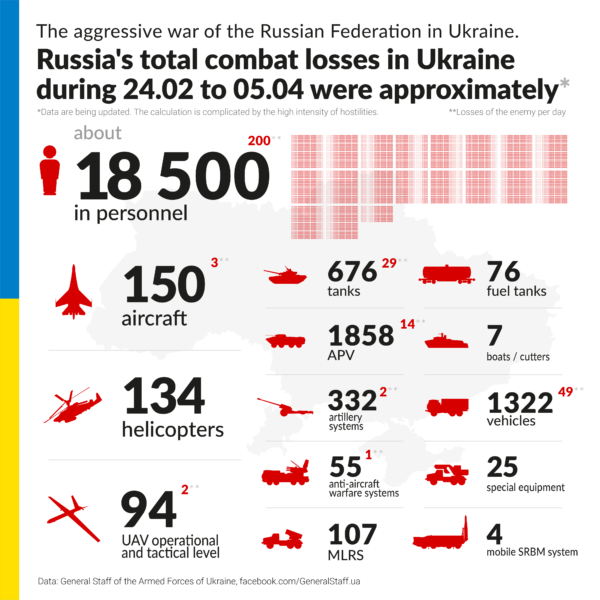
- personnel – more than 18500 people (+200),
- tanks – 676 units (+29),
- armored combat vehicles – 1858 units (+14),
- artillery systems – 332 (+2),
- multiple rocket launchers – 107 (no change)
- air defense means – 55 (+1),
- aircraft - 150 (+3),
- helicopters - 134 (no change),
- automotive technology – 1322 (+59),
- vessels/boats - 7 units (no change),
- fuel and lubricant tanks – 76 (no change),
- UAV operational and tactical level – 94 (+2)
- Special equipment – 25 no change)
- Mobile SRBM system – 4 (no change)
Humanitarian
- According to UNHCR 4,215,047 refugees have been registered as of April 3. The UN says that so far Poland has taken in 2,451,342 refugees, Romania 643,058, Republic of Moldova 394,740, Hungary 390,302, Russia 350,632 (no changes since March 29), Slovakia 301,405 and Belarus 15,281. Among those who fled Ukraine are also Ukrainian nationals with dual citizenship. An additional 113,000 people moved to the Russian Federation from the Donetsk and Luhansk regions between 21 and 23 February.
- OHCHR recorded 3,527 civilian casualties in Ukraine as of midnight of April 3: 1,430 killed (including 121 children) and 2,097 injured (including 178 children).
- 165 children were killed and 266 children injured - Office of the Prosecutor General of Ukraine reports that as of 8 a.m. on April 5.
- On April 4 all agreed humanitarian corridors operated, allowing for the evacuation of 3,346 people. According to the Deputy Prime Minister and Minister of Reintegration of Temporarily Occupied Territories of Ukraine. 2,405 citizens traveled from Mariupol and Berdiansk to Zaporizhzhia by their own transport, among them - 1,553 people are from Mariupol. 7 buses escorted by the Red Cross are still blocked by Russian troops in Mangush, not being able to execute an anticipated evacuation effort. In Luhansk oblast, 971 citizens have now been evacuated from the cities of Lysychansk, Sievierodonetsk, Rubizhne, Kreminna, and Hirske. Despite the agreement, foe systemically violated the rule of silence during the evacuation effort in the Luhansk Oblast.
- 79% of refugees plan to return to Ukraine after the war, according to a survey conducted by the Razumkov Center.
- There are about 600 Russians are in captivity in Ukraine, Ukrainska Pravda reports. Deputy Prime Minister for the Reintegration of the Temporarily Occupied Territories, Iryna Vereshchuk, said that about 600 Russian prisoners of war are currently in Ukraine.
Environmental
Ukraine is one of the most mined countries in the world, Ukrainska Pravda reports.
- After the first wave of Russian armed aggression against Ukraine in 2014, about 16,000 square kilometers of Luhansk and Donetsk Regions were contaminated with mines and explosive remnants of the war. Today, according to preliminary estimates, contamination reaches 80,000 square kilometers of the territory of Ukraine. While the entire civilized world is abandoning and banning anti-personnel landmines, Russia is increasing their use in Ukraine and even testing new types of anti-personnel mines such as POM-3 (Medallion) and others, the Ministry of Foreign Affairs of Ukraine says in a statement.
- Even before the ongoing military offensive, more than 1.8 million people had lived surrounded by mines for eight years. While the heavy fighting takes place in many parts of Ukraine, reportedly, new mines are planted near residential houses, hospitals, and along roads, the UN states.
Legal
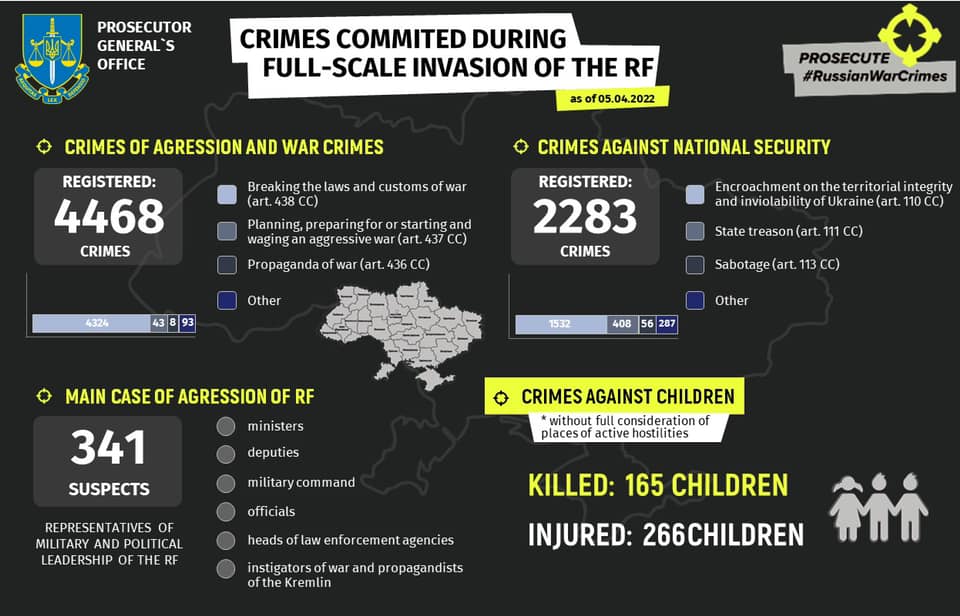 Signs of the massacre in Bucha spark calls for war-crime probes, the Washington Post
Signs of the massacre in Bucha spark calls for war-crime probes, the Washington Post
reports. “Ukrainian officials said they have asked the International Criminal Court (ICC) to visit the mass graves seen in Bucha, a suburb northwest of Kyiv, so experts can gather evidence of possible Russian war crimes. Condemnation of the alleged assault on civilians resounded around the world, with numerous countries demanding investigations and accountability.” On Sunday, Ukrainian President Volodymyr Zelensky said Russian attacks on Ukraine amounted to a genocide.
▪️Satellite images show bodies lay in Bucha for weeks, despite Russian claims - NYT
Russia's MinDef claimed that the bodies had been recently placed on the streets after “all Russian units withdrew completely from Bucha” around March 30. https://t.co/zyuKhtilb4#BuchaMassacre pic.twitter.com/yNhYM7qv2M
— Euromaidan Press (@EuromaidanPress) April 4, 2022
4468 crimes of aggression and war crimes and 2283 crimes against national security were registered as of the same date. 869 educational establishments are damaged as a result of shelling and bombings, 83 of them are destroyed fully.
According to the General Staff of Ukraine:
- The Russian troops carried out attacks on Mykolaiv with the cluster munitions forbidden by the Geneva convention. Civilian quarters and medical facilities, including a children's hospital, came under Russian fire. There are dead and wounded, including children
- In the Slobozhansky direction, in the city of Izium, the forces are carrying out filtration measures and forcible removal of residents to the territory of a Russian federation.
- In the temporarily occupied territories of the Zaporizhzhia Oblast, in the town of Polohy, servicemen of the armed forces of the Russian Federation seized and mined the inner territory of the central district hospital. Staff and patients were warned not to return to the hospital. The wounded Russian occupiers remained in the hospital.
Support
The US weighs tougher Russia sanctions after evidence of Bucha killings, the Washington Post reports. “The scope of the potential US retaliatory measures was not exactly clear, but senior Biden officials have previously discussed potentially devastating “secondary sanctions” that would target countries that continue to trade with Russia.” No decision has been taken.
EU Commission preparing more sanctions against Russia to raise the pressure, Reuters reports. “Asked if the package could include a ban buying on Russian oil, [Commission Executive Vice President Valdis] Dombrovskis said: As regards the Commission, nothing is off the table." Not all countries are ready to support a total ban on Russian imports, so the EU is discussing an alternative, European Truth reports. The essence of the alternative is the introduction of additional duties against Russian oil and coal. Although such a step will not ban imports from Russia, it will make it significantly more expensive, encouraging European countries to seek a replacement for energy resources from Russia.
After hours of debate, the ruling coalition in Bulgaria fails to decide on military aid to Ukraine, Radio Bulgaria reports. The talks among representatives of the four parties from the ruling coalition, which lasted close to three hours, were not made public. There is still no official decision on whether Bulgaria should send military aid to Ukraine.
Ship fuel suppliers stop serving Russian vessels in the Mediterranean, Reuters reports. “Marine fuel sellers have stopped serving vessels flying the Russian flag at major European hubs including Spain and Malta in another blow to Moscow's exports, five industry sources with knowledge of the matter told Reuters. Losing access to refuelling points in the Mediterranean Sea poses major logistical problems for Russian oil tankers going from Baltic ports to Asia and also creates safety concerns over potentially being stuck at sea with flammable cargoes, shipping sources say.”
 EU member states exported weapons to Russia after the 2014 embargo, Investigate Europe reports. “Missiles, aircraft, rockets, torpedoes, bombs. Russia continued to buy EU weapons until at least 2020. Despite the ongoing embargo, ten member states exported € 346 million worth of military equipment, according to public data analyzed by Investigate Europe. Some of these weapons could be used against Ukraine now. The data from all EU-27 official arms exports registers shows that between 2015 and 2020, at least 10 EU member states have exported a total of €346 million worth of arms to Russia.s. France, Germany, Italy, Austria, Bulgaria, Czech Republic, Croatia, Finland, Slovakia, and Spain – to different extents – have sold “military equipment” to Russia.
EU member states exported weapons to Russia after the 2014 embargo, Investigate Europe reports. “Missiles, aircraft, rockets, torpedoes, bombs. Russia continued to buy EU weapons until at least 2020. Despite the ongoing embargo, ten member states exported € 346 million worth of military equipment, according to public data analyzed by Investigate Europe. Some of these weapons could be used against Ukraine now. The data from all EU-27 official arms exports registers shows that between 2015 and 2020, at least 10 EU member states have exported a total of €346 million worth of arms to Russia.s. France, Germany, Italy, Austria, Bulgaria, Czech Republic, Croatia, Finland, Slovakia, and Spain – to different extents – have sold “military equipment” to Russia.
New developments
- Russia to ask UN Security Council again to discuss Bucha “provocations” – Tuesday?
- Germany expels 40 Russian diplomats over war crimes in Ukraine, the Daily Sabah reports. “Germany has expelled a "significant number" of Russian diplomats in what Foreign Minister Annalena Baerbock called a response to the "unbelievable brutality" the Kremlin had unleashed in Ukraine. According to the Agence France-Presse (AFP) report published late Monday, the move involves 40 envoys and follows similar moves by European partners in recent days as a reaction to Russia's war on its neighbor.”
This is the last in a line of many similar decisions. A week after Poland announced the expulsion of 45 Russian diplomats, the foreign ministries of Belgium, the Czech Republic, Ireland, and the Netherlands announced on March 29 that they would expel Russian diplomats. A day later, Slovakia followed up by announcing it will expel 35 Russian diplomats, Intelnews reports.
- Negotiations between Russia and Ukraine:
- Delaying the negotiation process by Russia will have negative consequences for it, the President of Ukraine says. “Peace in Ukraine is impossible without victory, and victory can be achieved through diplomacy in parallel with the fighting of the Ukrainian army. The Head of State noted that the Foreign Ministers of Ukraine and Russia met in Türkiye, but the meeting ended in vain. He stressed that the delay in the negotiation process by Russia will have negative consequences for this country.”
- By a decree of April 4, Zelensky formed a delegation to participate in negotiations with Russia on the preparation and approval of a draft agreement on security guarantees for Ukraine, Ukrainska Pravda reports. People's Deputy David Arahamia was appointed head of the delegation.
- Putin-Zelenskyy summit can take place when there is a result in the negotiations, TASS reports. The meeting of the presidents of the Russian Federation and Ukraine, Vladimir Putin and Vladimir Zelensky, may take place after reaching a result in Russian-Ukrainian negotiations in order to consolidate it. This was stated on Monday by Russian Foreign Minister Sergei Lavrov.
The goals of our operation were announced by the president, and we are working to ensure that these goals are recorded in the treaty, which is now being discussed and is being prepared. I hope it will eventually be created and finalized in all its provisions," the minister said at a press conference on Monday, RIA reports.
Assessment
On the War
The Institute for the Study of War
has made the following assessment as of Monday 04 April:
However, Russian forces advancing from the Kharkiv axis are setting conditions to resume offensive operations through the city of Sloviansk to link up with other Russian forces in Donbas and encircle Ukrainian defenders. Russian forces captured Izium (southeast of Kharkiv) on April 1 and have conducted active preparations to resume offensive operations for the past three days—stockpiling supplies, refitting damaged units, repairing the damaged bridge in Izium, and conducting reconnaissance in force missions toward the southeast. Russian forces will likely begin offensive operations towards Sloviansk, 50km southeast of Izium, in the coming days.
Efforts by Russian forces advancing from Izium to capture Sloviansk will likely prove to be the next pivotal battle of the war in Ukraine. Russian forces likely intend to cut off Ukrainian forces in eastern Ukraine and will need to take Sloviansk as their minimum step to do so. If Russian forces take Sloviansk, they will then have the option to advance directly east to link up with Russian forces fighting in Rubizhne—a shorter drive that will not isolate many Ukrainian forces—or advance toward Horlivka and Donetsk to attempt a wider encirclement of Ukrainian forces. Both options could enable at least limited Russian breakthroughs in Luhansk Oblast. If Russian forces are unable to take Sloviansk at all, Russian frontal assaults in Donbas are unlikely to independently break through Ukrainian defenses and Russia’s campaign to capture the entirety of Luhansk and Donetsk oblasts will likely fail.
Degraded Russian forces in northeastern Ukraine continued to withdraw to Russia and are unlikely to be effective elsewhere, despite ongoing Russian efforts to redeploy them to eastern Ukraine. Ukrainian forces are conducting operations to clear Russians left behind in the withdrawal, and Russian forces are unlikely to hold any cohesive defensive positions. The Ukrainian military reported that elements of Russian VDV (Airborne) units withdrawn from northern Kyiv flew to Belgorod, Russia, on April 4. These units are understrength, missing equipment, and likely highly demoralized. Russian servicemen from the Kyiv axis ordered to renter combat operations may desert or refuse orders, which has occurred in several Russian units throughout the war—including several units that had not yet entered combat.
Key Takeaways
- Russian forces in Izium are setting conditions to begin offensive operations southeast toward Sloviansk in the coming days to link up with other Russian forces in Donbas and encircle Ukrainian defenders.
- Russian forces in Donetsk and Luhansk Oblasts continue to make little to no progress and face mounting casualties and declining morale. Replacements and reinforcements from northeastern Ukraine are highly unlikely to meaningfully change the balance of forces.
- Efforts by Russian forces advancing from Izium to capture Sloviansk and threaten Ukrainian forces in Donbas with encirclement will likely prove to be the next pivotal battle of the war in Ukraine. If Russian forces are unable to take Sloviansk, Russia’s campaign to capture the entirety of Luhansk and Donetsk oblasts will likely fail.
- The defenders of Mariupol have outperformed ISW’s previous estimates, and Russian forces are likely taking heavy casualties in ongoing efforts to capture the city.
- Ukrainian forces likely conducted successful counterattacks in Kherson Oblast in the last 24 hours.
- Russian forces have almost completely withdrawn from Chernihiv and Sumy oblasts and will likely completely vacate these regions in the coming days.
- Russian forces withdrew from the Kyiv axis are highly unlikely to be effectively deployed elsewhere in Ukraine and are likely a spent force.”
“The collective West itself is the designer, source and sponsor of the Ukrainian Nazism, while the Western cadres of S.Bandera and their “historical memory” are only one tool for turning Ukraine into Nazi sympathizers. Ukro-Nazi carries a greater, not lesser, threat to the world and to Russia than did the German Nazism a la Hitler.” […]
“Ukraine is impossible as a nation-state, as history has shown, and any attempts to “build” a nation-state naturally lead to Nazism. Ukrainism is an artificial anti-Russian construct that does not have its own civilizational content; it’s a subordinate element of an alien and unnatural civilization.“
“Within the framework of this operation, de-Nazifying as the goal of a special military operation includes a military victory over the Kyiv regime, the liberation of territories from the armed supporters of the Nazis, the elimination of implacable Nazis, the capture of war criminals, and the creation of systemic conditions for the subsequent de-Nazifying in peacetime.”
Since it comes across as something between a Russian version of “Mein Kampf” and the ramblings of a lunatic, I was initially not planning to comment upon it. I changed my mind, however, after reading yet another RIA article from yesterday that quoted Lavrov saying that “the goals of our operation were announced by the president, and we are working to ensure that these goals are recorded in the treaty.” These goals include de-Nazification. The need for de-Ukrainization and de-Europeanization has been a part of President Putin’s narrative since 2008.
In my opinion, the publication of the article might be read as a declaration of Russian intent and a warning of what is at stake. This is further demonstrated by the Russian atrocities in Bucha, Mariupol, Chernihiv, and other cities across Ukraine. The article argues that Ukraine should be divided, leaving the five western oblasts for the “Russian haters”.
The Russian refocus and force concentration in the east might, therefore, still involve the idea of "Denazification, de-Ukrainization, and de-Europeanization" of everything east of Dnieper.
Consequences and what to do?
The article “As the war in Ukraine rages on, Europe braces itself for stagflation” published by euronews, highlights some of the many ripple effects of the Russian war in Ukraine and the fundamental challenges the West is facing in the time to come. The present unity of efforts and will to punish Putin for his atrocities in Ukraine and beyond will be tested.
“Annual inflation in the Eurozone has surged to 7.5%, up from 5.9% in February and higher than most analysts had predicted. Energy prices alone have skyrocketed 44.7% on a yearly basis, a stunning rise compared to the 4.3% rate registered in March 2021.
Companies across the continent are now battling impossibly high bills that threaten to disrupt production and shut down factories while households see their purchasing power plunge at record speed.
As Moscow shows no signs of giving up on its brutal military campaign, uncertainty over the EU's immediate future only deepens. The perfect storm of rising prices, constrained supply chains, and economic deceleration is fuelling fears of stagnation and a sudden halt to the post-coronavirus revival.
"Europe is entering a difficult phase. We will face, in the short term, higher inflation and slower growth. There is considerable uncertainty about how large these effects will be and how long they will last for," said Christine Lagarde, president of the European Central Bank. […]
But while policymakers are rushing to offer relief measures, the war's dramatic evolution is increasing calls for harsher sanctions against Moscow. New reports of indiscriminate killings in Bucha, a suburb northwest of Kyiv, has brought back to the table the potential embargo on Russian energy imports, a drastic proposal that would plunge the bloc into further economic chaos. […]
"German industry sees the risk of companies facing existential difficulties due to energy prices or because of a Russian halt to exports of energy raw materials," said Joachim Lang, director-general of BDI, the federation of German industries, in a statement to Euronews. […] The country, Europe's economic powerhouse, is now on the verge of "substantial" recession risk, the government's council of economic advisers has warned. […]
The grim turn of events over the past month has inevitably raised the much-dreaded spectre of stagflation, a period characterised by economic stagnation, high inflation, and high unemployment. […]
Energy, however, is not the only headache besetting consumers: inflation is set to be stoked up by an imminent food crisis on a global scale. Ukraine and Russia are considered the breadbaskets of the world, producing about 30% of food commodities such as wheat and maize. David Beasley, the head of the UN's World Food Program, has said the conflict will create "a catastrophe on top of a catastrophe" and may trigger the worst global food crisis since World War II. […]
Altogether, the food crisis, the power crunch, the supply chains collapse and the overall trade disruption precipitated by the Ukraine war presage a long, arduous path for the European economy, where high inflation is no longer a temporary dilemma, as many had anticipated before the invasion, and instead becomes a challenge for the long haul, pushing the ECB's 2% target into an uncertain, distant future.
"We also have to take into account that we will have some second-round effects now that prices are high for energy and food. At the end of the day, that might also pop up into other prices. High energy prices will make also other goods and services more expensive," warns Vanden Houte, who previously had described the war as "more of a game-changer" than COVID-19.”
“Will Western leaders cut and run as the costs of the Ukraine war mount”, Simon Tisdall asks in an op-ed in The Guardian?
“How long will the western democracies maintain present levels of support for Ukraine? The war’s economic impact, already manifesting itself through spiralling inflation and living costs, could have seriously negative political consequences for elected leaders in the US, Germany, France and the UK. If public willingness to make difficult sacrifices diminishes in the months ahead and the conflict slips off the front pages, will they stay the course?
As Ukraine’s president, Volodymyr Zelenskyy, is keenly aware, western love for his country is already highly conditional. Military assistance is limited by NATO’s fear of provoking Vladimir Putin. […]
In Spain, the far-right populist party, Vox, has used rising prices to fuel anti-government demonstrations. Similarly, politicized protests have been seen in France, Italy, and Greece. Worries about a wider war, meanwhile, may help Viktor Orbán, Hungary’s Putin-friendly prime minister, win re-election this weekend.
It may be that western politicians will keep their word and honour their commitments to Ukraine. Or maybe not. Zelenskyy, for one, has his doubts.»
Assessment by Hans Petter Midttun:
The reason for highlighting the costs is to point out the fact that (1) the Russian aggressions affect us all because (2) the War in Ukraine is only an element of Russia’s hybrid war against the West, and (3) that political courage and resolve is needed as (4) both Europe and the USA starts feeling the full ripple effects of lack of energy and food security, inflation, rising costs of living, unemployment, and the consequential political costs as discontent among the populations' increases.
This is, however, the price we need to pay to ensure freedom, security and stability. Political costs are not – and should not be - a part of the calculus.
How long the “stagflation” will last, however, is up to the political leadership of NATO, the EU, and the USA to decide.
An UN-mandated humanitarian intervention enforced by NATO and a coalition of the willing will stop the war and evict Russia from Ukraine. It will force Russia to review its strategy, aim and objectives. A continuation of the present strategy, regardless of energy sanctions or energy disruption, will ensure increasingly more severe consequences.
Humanitarian intervention is in the interest of both the West and Ukraine.

